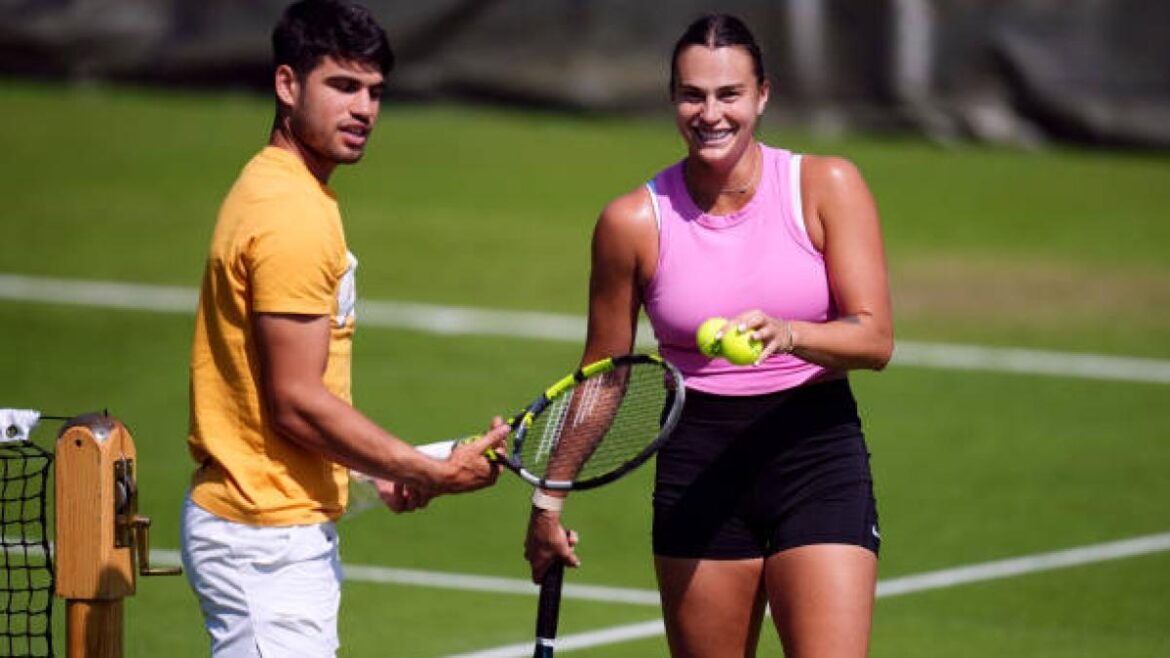Carlos Alcaraz Regains Form at Wimbledon, Sabalenka Eyes First Title
Wimbledon fans got what they came for on Sunday—power, drama, and the rise of tennis heavyweights. Carlos Alcaraz and Aryna Sabalenka both carved their path into the quarterfinals, delivering matches that clung to emotions and lit up Centre Court.
Alcaraz, aiming for a third consecutive Wimbledon title, overcame a shocking first set loss to push past Russia’s Andrey Rublev. At the same time, women’s world number one Aryna Sabalenka continued her near-flawless campaign by knocking out old partner Elise Mertens in straight sets.
The atmosphere? Intense. The pressure? Thick. The promise of more surprises this week? Almost guaranteed.
Alcaraz vs. Rublev: Finding Rhythm After Rough Start
It didn’t look great early on. Alcaraz, Spain’s crowd-favorite and second seed, dropped the opening set in a tiebreaker. But then came the turnaround. He claimed the next three sets 6-3, 6-4, 6-4 and walked off Centre Court looking like the player Wimbledon fans were waiting to see.
“I think I played intelligent and smart today against him, tactically,” Alcaraz said. “A really good match, which I’m really proud about.”
Truthfully, Alcaraz has been inconsistent throughout this championship. He lost three sets in his first three matches. So, when Rublev went ahead, the Spaniard shifted tactics rather than panicking. The match evolved into a showcase of raw endurance and quick thinking.
At 22, Alcaraz already holds five Grand Slam titles. But on Centre Court, even he admits it comes down to staying locked in at every point.
“One point can change the match completely… In tennis, you have to stay there all the time. Being strong mentally, to stay there. I knew that I was going to play better.”
Timeline of Events
- First set: Rublev wins 7-6 (7/5) after a tightly contested tiebreak.
- Second set: Alcaraz settles into his rhythm, drops just three games.
- Final sets: Strategic tennis and improved serve placement push Alcaraz to win 6-4, 6-4.
Cameron Norrie Awaits
Next up for Alcaraz is a face-off against Britain’s last man standing—Cameron Norrie. The hometown hero pulled off a massive comeback win over Nicolas Jarry after five tough sets. The stage? Set for fireworks between two very different playing styles.
Sabalenka Storms Ahead
On the women’s side, Aryna Sabalenka isn’t just surviving—she’s dominating. In four rounds, she’s yet to drop a set. Her fourth-round match against Belgian Elise Mertens looked different, though—not just an easy roll.
She still won 6-4, 7-6 (7/4), but even as she celebrated, it was clear Mertens had pushed her harder than previous opponents.
“With your support guys I think everything is possible,” Sabalenka told the crowd. “Every time I’m here I’m trying to give my best and really hope for the best.”
Strong words from a player fighting more than just opponents. Remember, Sabalenka missed Wimbledon in 2022 due to the ban on Russian and Belarusian athletes. Then injury took her out last year. Now she’s back, and clearly, she’s on a mission.
Ups and Miscalls: Pavlyuchenkova’s Strange Encounter
Another headline moment came from Anastasia Pavlyuchenkova’s match against British hopeful Sonay Kartal. For a few minutes, tennis took a back seat as players and fans tried to process a bizarre electronic line-calling failure.
Kartal hit a shot clearly beyond the baseline. No call. The umpire ordered the point be replayed. Pavlyuchenkova—at game point—lost composure and then the game. She fought back though, took the tie-break, and eventually claimed the 7-6 (7/3), 6-4 win.
“They stole the game from me, they stole it,” Pavlyuchenkova told the umpire angrily.
Official Statements
The All England Club quickly released a comment regarding the incident:
“Due to operator error the system was deactivated on the point in question,” a spokesperson said. “The chair umpire followed the established process.”
The glitch added fuel to already simmering concerns from players and spectators over technology reliability on crucial points. How judges move forward with tighter regulations—or fail to—could impact more than just one game.
Other Results: Khachanov And Fritz Progress
Not every match carried drama. Karen Khachanov breezed past Poland’s Kamil Majchrzak in straight sets: 6-4, 6-2, 6-3. Solid, clean, and businesslike.
Meanwhile, America’s Taylor Fritz benefited from his opponent’s injury. Australia’s Jordan Thompson retired after just 41 minutes on Court One, trailing 6-1, 3-0. A frustrating end for one player, relief for another.
Fritz, the Eastbourne champion, had been weathering back-to-back five-set battles in earlier rounds. A needed break? Definitely. But he’ll face a stiffer challenge going forward—maybe even against Khachanov.
What’s Next?
So, what should you expect heading into quarterfinals week?
- Can Alcaraz keep climbing as Norrie looms? His game is back, but is he fully consistent?
- Will Sabalenka finally break her Wimbledon curse and cruise into the final?
- Do glitches like Pavlyuchenkova’s match raise real integrity concerns in early rounds?
- Could minor players like Khachanov or Fritz sneak into semifinal territory?
This next week feels unpredictable. But there’s beauty in that. Let’s be honest—Wimbledon isn’t just about stats. It’s about the roar of the crowd, the slipped grips, the late challenges, the comebacks. And those comebacks? They tend to define the tournament.
Stay tuned, because if the early rounds are anything to go by, the quarters and semis might be gut-checks for even the sport’s brightest stars.

